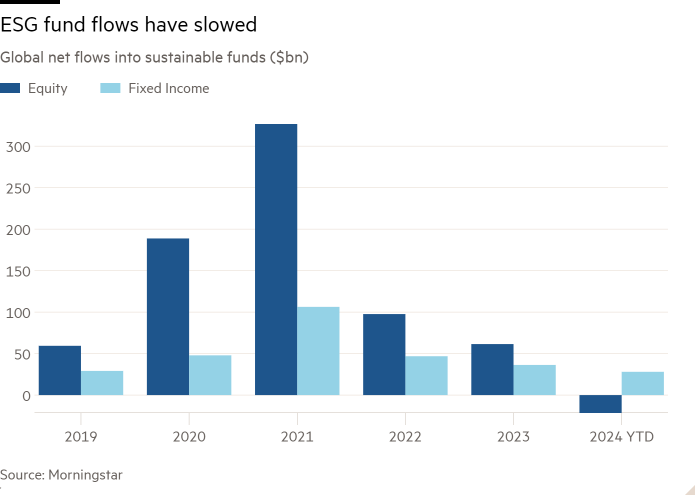
ESG funds — how to play a diffuse category
Financial Times
Unlock the Editor’s Digest for free
Roula Khalaf, Editor of the FT, selects her favourite stories in this weekly newsletter.
ESG funds, politicised and weaponised, are bleeding. A net $40bn has been pulled from environmental, social and governance equity funds so far this year, according to research from Barclays. Time for investors to rethink their allocations?
Not so fast. The amounts are relatively small — worldwide, ESG open-ended equity funds and ETFs sit on $1.9tn, according to Morningstar Direct, still less than 7 per cent of total equity funds.
There have been stumbles before and will be more to come. That is inevitable in a sector that has been going since 2004, when climate activist Greta Thunberg was just a baby.
Besides, withdrawals are less to do with the limited impact on real world aims — nations backpedalling on green pledges, say, or fresh holes in corporate governance — than financial performance. The Nasdaq has generated about 50 per cent more gains than the MSCI ESG Leaders’ index over the past two years.
No surprise. Tech stocks have dominated in the recent AI-driven rally. Renewable energy paled in comparison with their fossil fuel peers when Russia invaded Ukraine, inflating oil prices and hence traditional oil and gas operators such as BP and Shell.
“Numerous studies show that ESG-related proposals tend to harm financial returns,” railed the US House Committee on Financial Services’ ESG Working Group. But a body tasked with protecting “the financial interest of everyday investors from progressive activists” naturally has an axe to grind.
Republican angst aside, there are certainly faults with ESG. Aims can be contradictory. Take EVs, which tick the environmental box. But mining cobalt for the batteries, largely in the Democratic Republic of Congo, carries social costs in terms of labour and displacement of homes.
There are any number of quibbles over what constitutes an ethically “good” investment. Weapons are shunned by some; others see defence — the clue is in the name — as beneficial.
Politicisation explains some of the more high-profile withdrawals. A school fund in Texas, which leads the US in terms of wind energy production and is bested only by California on solar, in March nixed its contracts with BlackRock, accusing it of boycotting fossil fuels, which the US-based fund manager denies.
BlackRock presides over $800bn of assets under management in its sustainable investing platform — chair Larry Fink ditched the ESG term, saying it had become weaponised — which offers more
The full article is available here. This article was published at FT Markets.
Comments are closed for this article!